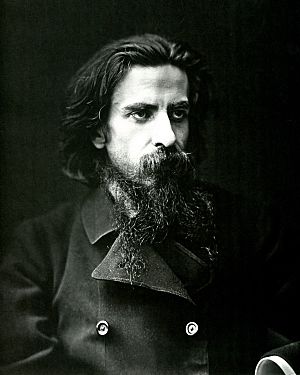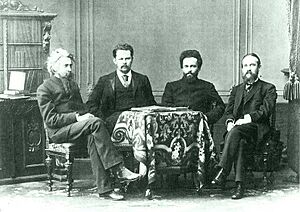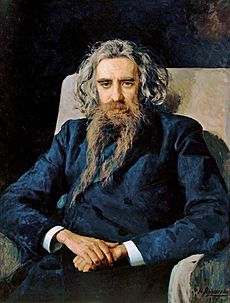Vladimir Solovyov (philosopher) facts for kids
Quick facts for kids
Vladimir Solovyov
|
|
|---|---|
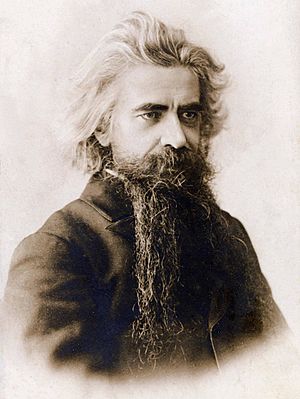
Vladimir Solovyov c. 1900
|
|
| Born |
Vladimir Sergeyevich Solovyov
28 January 1853 |
| Died | 13 August 1900 (aged 47) Uzkoye, Moscow Governorate, Russian Empire
|
| Alma mater | Imperial Moscow University |
| Era | 19th-century philosophy |
| Region | Russian philosophy |
| School | Christian philosophy, sophiology, Christian mysticism, Russian symbolism, Russian Schellingianism |
|
Main interests
|
Philosophy of religion |
|
Notable ideas
|
Reviving and expanded the idea of Sophia |
|
Influences
|
|
|
Influenced
|
|
Vladimir Sergeyevich Solovyov (Russian: Влади́мир Серге́евич Соловьёв) was an important philosopher, theologian, poet, and literary critic from Russia. He greatly influenced Russian thought and poetry in the late 1800s and early 1900s.
Contents
Life and Early Ideas
Vladimir Solovyov was born in Moscow in 1853. His father, Sergey Mikhaylovich Solovyov, was a famous historian. Vladimir had an older brother, Vsevolod, who became a novelist, and a younger sister, Polyxena, who became a poet. His mother's family had Polish roots and included the philosopher Gregory Skovoroda.
As a teenager, Vladimir explored different ideas. He first moved away from the Eastern Orthodox Church but later returned to views that matched the Church's teachings. From 1869 to 1873, he studied at the Imperial Moscow University.
In 1874, Solovyov wrote a book called The Crisis of Western Philosophy: Against the Positivists. In this book, he disagreed with positivism, a way of thinking that only trusts what can be proven by science. Solovyov believed that people also understand things through insight and a deeper kind of awareness. He thought that true understanding comes from both logic and intuition.
Friendships and Beliefs
In 1877, Solovyov moved to Saint Petersburg. There, he became good friends with the famous writer Fyodor Dostoyevsky.
Solovyov was interested in bringing together different Christian churches. He believed in healing the split between the Orthodox and Roman Catholic Churches. He thought the Pope should lead the whole Christian Church, but it's not clear if he ever officially joined the Roman Catholic Church.
He also supported Jewish civil rights in Russia during the 1880s. He even spoke Hebrew and tried to find common ground between Judaism and Christianity. Solovyov wrote to The London Times to ask for international help for Jewish people. He was known as a "friend of the Jews."
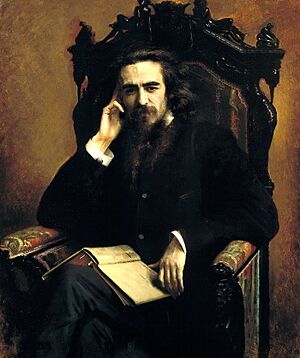
In his later years, Solovyov became worried about conflicts between different cultures, especially between Russia and Asian countries. He wrote a short story called "Tale of the Antichrist" in 1900, where China and Japan join forces to conquer Russia. His poem Pan-Mongolism (1894) was seen as predicting the Russo-Japanese War that happened a few years later.
Solovyov never married. He was a vegetarian in his later years, though he sometimes ate fish. He often lived alone and worked late into the night.
His Impact on Others
Many people believe that Solovyov inspired the characters Alyosha Karamazov and Ivan Karamazov in Dostoyevsky's famous novel The Brothers Karamazov.
Even though he didn't create one single, huge philosophical work, Solovyov's writings greatly influenced religious and philosophical thinking in Russia. His ideas also shaped the Symbolist art movement and other thinkers of his time. His book The Meaning of Love [ru] influenced Leo Tolstoy's The Kreutzer Sonata. In this book, Solovyov introduced the idea of 'syzygy', which means a very close union.
Sophiology: The Wisdom of God
Solovyov developed a unique philosophy called Sophiology. This idea combined ancient Greek philosophy (like the ideas of Plato and Aristotle) with early Christian traditions. He also included elements from Buddhism and Kabbalah, which is a mystical part of Judaism. He even studied Gnosticism, an ancient religious belief system.
His main idea was to bring together different religious traditions with Orthodox Christianity. He wrote about his experiences with an entity he called Sophia, which means "wisdom." He saw Sophia as the kind, unifying feminine wisdom of God, similar to the Hebrew Shekinah or other goddess traditions.
Some parts of the Orthodox Church have disagreed with his teachings on Sophia, calling them unsound. However, not all parts of the Orthodox Church agreed with this condemnation.
Sobornost: Bringing Ideas Together
Solovyov wanted to create a philosophy that could connect all different types of knowledge and ideas. A key part of this was the Russian idea of sobornost. This word means an organic or natural way of bringing things together.
Solovyov tried to find common ground between different ideas and people. By focusing on what they shared, he hoped to create a complete unity of opposing thoughts and groups.
His Final Years
Working very hard on his ideas made Solovyov's health worse. He passed away in 1900 at an estate near Moscow.
He left behind his brother, Mikhail, and several friends who continued to share and promote his ideas. Vladimir Solovyov is buried at Novodevichy Convent.
See also
 In Spanish: Vladímir Soloviov (filósofo) para niños
In Spanish: Vladímir Soloviov (filósofo) para niños
- Apophatic theology
- Mikhail Epstein
- Leo Mikhailovich Lopatin
- Vladimir Lossky
- Phronesis
 | Selma Burke |
 | Pauline Powell Burns |
 | Frederick J. Brown |
 | Robert Blackburn |


